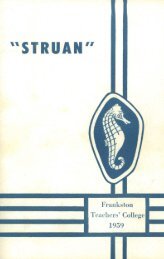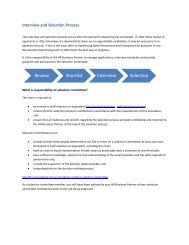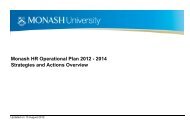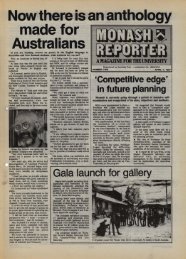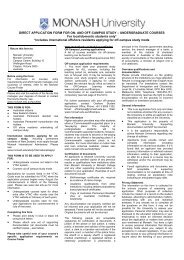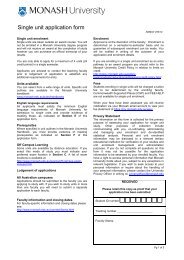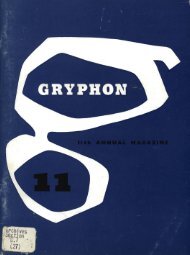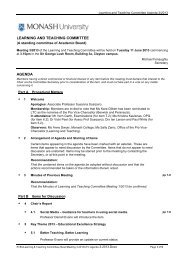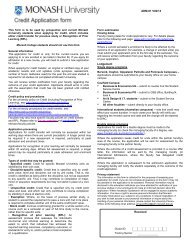Struan 1961 - Adm.monash.edu
Struan 1961 - Adm.monash.edu
Struan 1961 - Adm.monash.edu
Create successful ePaper yourself
Turn your PDF publications into a flip-book with our unique Google optimized e-Paper software.
of lowering both the infant mortality and dea thrates. The result is that population has begun togrow at an alarming pac e.This increase, however, has not been consistent inall ar eas . While countries such as Australia andAmerica have increased by several millions, othercountries like China have increased by hundredsof millions. In fact it is said that China's popu lationis increasing at the rate of a million a month.The time must come when she reaches saturat ionpoint and the question arises, wha t will happenthen? Will the author ities try to find a way ofsupporting all these people or will they look aroundfor empty areas into which their surplus maymove?These are questions which ar e troubling theAustralian observers in particular for Australia withher empty northen plains would prove to be analmost irresistible temptation at such a time.Alread y, however, author ities all over th e worldare being forc ed to admit that problems such asslums, low standards of living, fam ine, disease,vandalism and even crime can be traced back tounnatural overcrowding, and they are realizing thatunless some effective control is introdu ced in thevery near future the situation may grow out of hand.Several suggestions have been put for ward bythose anxious to help. One is that efforts will haveto be made to increase food production all over theworld by utilizing the deserts and oceans . Thi sdoes have possibilities but if the population continuesto grow at th e present rate even this solutionwill not be able to satisfy the dem and .No, it would seem that some effort must be madealmost immediately to stop or at least stem theincrease itself. Birth -contr cl seems to be thesolution.Two issues, however , present themselves here.The first is whether an effecti ve and practicablemethod is likely to be made widely avail able in timeto do much good. The seco nd is whether religiousand social customs would allow people and governmentsto accept it. Experiments ar e continuallybeing made in an effort to find a drug that is cheap,effective and harmless. As yet none ha s beendevised to really fulfil all these qualifica tionsalth ough there are many typ es in use. Once theideal drug has been found it will be welcomed bymost governme nts of Asian coun tries, wher e thealarming popu lation incr ease is forcing down standardsof living.There seems to be a great deal of confusionabout the second issue. It seems that none of themajor religions of the world are actually againstbirth-control, although some, for example the RomanCatholic Church, are against th e method by whichit is brought about. No real oppos itio n is expectedfr om th is source then if the individuals concernedbehave as their conscience dictates . Most govern ments, as I have already said , realize wha t aterrible burden this population increase is going tobe on the economy and are only too willing to limitit if they can.The one problem which still remains unsolvedsems to be how to find a way of introducing theidea to nations and individual people, without injuringtheir pride or beliefs. The problem is importantand becomes more vita l as time goes by. Whetheror not it can be solved satisfactorily will be seenin the next few years, when this increase willeither be stemmed or allow ed to grow out ofcontrol. Only time, it seems, will tell.Page Twenty-eightCONSTRUCTIVE USES FORSTRING IN THE ELEMENTARY SCHOOL SOCIALSTUDIES CURRICULUM- M. Cowell(An extract from a new S.S. Textbook fortea chers from the U.S.A.)The value and supreme democratic effect ofstring can scarce ly be 'overlooked, nay, over emphasised in the construction of a modern Western,democratic and contemporary course inSocial Studies, its binding influence can createwithin the well formulated group a sense of sublime comradeship and responsibility unequalled inthe realms of man's desire to live and co-operatewithin a democratic society. Is this to say (I hearyour anguished cry ) that string of its own phys»cal existe nce creates intelligent, peaceful andcri tical co-existence, envi saged in the minds of allresp onsible and sensible citizens of our day andage. "Nay, nay, nay!" I say, without fear ofcriticism on the grounds of r<strong>edu</strong>ndancy or on theplane of rational thinking. Its value lies in itsoverwhelming, dynamic yet subtle personality asthe go-between tw ixt the ethereal and material.It is at this point that we must define ourterms 'ethereal' and 'material', in order that wemay remain critical, yea, even unto ourselves-andhow imp or tant this is to reinforce the very foundationsof democracy in this time of political andsocial tu rbulence when conventional morals andstanda rds appear to be increasingly on the wayout. The foundations of democracy must be reinforcedas can be seen or the insurgent tide ofnihilism will wash it into the sea of yesterday'sdoctrines. But is it really nihilist? It must beapparent to the average thinking citizen, whetherhe be banker , teacher, doctor , garbage collector orsanita ry mechanic , that this movement to expelour social and moral fibre mu st have a hardcentral core actually organising the chaos. A childcould not hope to remedy this situation on hisown, so he must be brought close to a groupthrough which, and ultimately withdrawn and forwhom, he must tackle the many problems confronting him in this respect. To do this he maydefine 'ethereal' as those things which are of anethereal nature, and 'material' as those which areof material substance.So now we see clearly, the simple basic unadornedproblem. On one hand we have theethereal, on the oth er the material, waiting to bebrought together to create a social attitude whereindemocratic living will exist and thrive in unprecedentedabundance and self-sufficiency. Butthe problem is actually a very complex one , andevery well-meaning tea cher should continually cas ta reflective glance at his Social Studies course tosee if the two are being brought into the closestconta ct possible. If he can view his course in sucha manner, and in so doing experience a glow ofsatisfaction at the definite kn owledge of a missionSTRUAN



